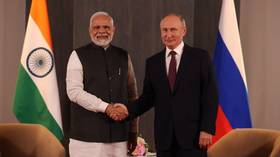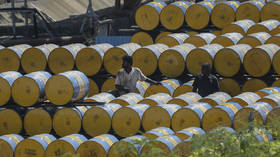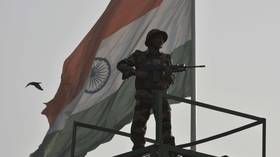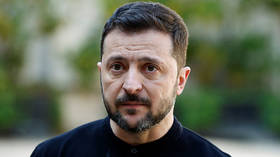Western diplomacy is immature and incapable of dialogue – Russian ambassador to India
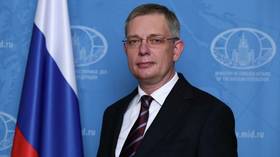
The Russian ambassador to India, Denis Alipov, assumed office early in 2022, having worked in the country in various diplomatic capacities for decades.
On the occasion of Russian Diplomats’ Day, which was observed at the nation’s missions around the world on February 10, Alipov spoke with RT on a host of issues, ranging from the challenges faced by diplomats following the launch of Moscow’s military operation in Ukraine, to Indo-Russian defense deals and the journey towards a multipolar world, as well as the rise of the Global South.
RT: This year was certainly not easy for Russian diplomacy after the start of the military operation in Donbass. But did Russian diplomats in India and other Asian countries feel it? How did the operation affect your work personally?
Denis Alipov: Last year was indeed unusual. The intensity, the challenges, and the scope of work for the Russian foreign service have substantially increased.
In India, the Russian Embassy operates in a completely different environment as compared to Europe and the US, which chose to almost completely freeze the relationship with Russia. In my view, it reflects the immaturity of Western diplomacy, which is incapable of dialogue and compromise at the time of crisis, which it itself created – as is evident from the deceitful subversion of the negotiation process over Ukraine.
We have maintained close communication with the Indian government and continuously expand our engagement with the public. It is indicative of the friendly and strategic nature of our traditional partnership. In 2022, we have seen notable upward dynamics of various exchanges and an increase of interest to explore new avenues in trade. Our dialogue on political and strategic matters as well as in defense and other sensitive areas is extremely candid and intense.
- Do you have the feeling that a new world order is being formed? If so, what will it be like? And what place in this world will be occupied by BRICS, SCO, and other organizations in which Russia and India act as equal partners?
- Obviously, the progress towards the multipolar world order has accelerated. The clout of India, China, Brazil, South Africa in global decision-making has increased dramatically. There is no turning back to the Western-centric globalization model, which failed to ensure lasting stability and sustainable development. The US, on the contrary, seems unable to relinquish its hegemony and continues to promote a confrontational agenda, resorting to double standards and interference in domestic affairs. Acting a little more subtly by engaging with other countries on the notion of the so-called rules-based order, it doesn’t conceal the intention to set up a new international order on Western patterns. Needless to say, these actions undermine the existing system of international law which rests on the UN Charter, where all countries are deemed equal.
On the contrary, Russia and the majority of likeminded countries in Asia, Africa, and Latin America stand for an equal multipolar world arrangement based on the central role of the UN and international law. BRICS [Brazil, Russia, India, China, and South Africa] and the SCO [Shanghai Cooperation Organization] agenda is very much focused on that, as reflected by a growing number of new candidates aspiring to join these associations.
Importantly, the current Indian G20 presidency is a case in point. India is resisting the attempts to politicize this crucial forum and puts forward the role of developing countries, which are suffering the most from the energy and food crises and supply chain disruptions caused by the Western unilateral sanctions.
- India is already an important partner for Russia. Do you expect its role to increase in the coming years alongside Moscow’s renewed focus on the Global South?
- Throughout the 75 years of diplomatic relations, India retained a special focus in Russian foreign policy that is evident in proud landmarks in industry, science, defense, energy, nuclear power, space, and humanitarian ties. Our cooperation has always been mutually beneficial and complementary. We have no political differences but a common desire to further deepen and diversify our partnership, which got special and privileged status in 2010.
Obviously, India’s role in regional and global affairs is on the rise as Russia has put emphasis on its partners in the East and Global South. The epicenter of world politics and economic development has clearly shifted eastwards and this will facilitate a more equal and balanced dispensation of power. Russia, being itself a nation of the East and the Pacific, is set together with India to take a major part in that process.
- What’s the latest update on the production of T-90 tanks, Sukhoi 30 MKI fighter jets, AK-203 assault rifles, and other weapons under New Delhi’s “Make in India” initiative? What’s the status of the joint project on the creation of BrahMos supersonic cruise missiles and the supply of S-400 missile systems?
- Russia-India defense cooperation is the strongest pillar of the bilateral special and privileged strategic partnership. It has a decades-long and time-tested background and remains unprecedented. It reflects a unique and deep-rooted trust between our countries and dedication to go ahead. Unlike other countries, Russia offers the maximum level of transfer of advanced defense technologies.
We are indeed proud of our achievements, which go far beyond traditional buyer-seller relations. Among them are very successful licensed production in India of T-90 tanks, Su-30 MKI fighters, and other armaments and components, as well as joint ventures of BrahMos missiles and AK-203 assault rifles production. Importantly, this cooperation significantly contributes to the Indian defense capabilities and fully complies with the requirements under “Make in India” and “Self-reliant India” (“Atmanirbhar Bharat”) initiatives.
We are committed to implement all our deals in a timely manner, including S-400 missile systems’ delivery. Our dialogue is comprehensive and forward-looking. We carry it on in the framework of the bilateral Intergovernmental Commission on military and military-technical cooperation. Our participation in dedicated international events in both countries is huge. In this sense, Russia is among the most active participants in the current Aero India 2023 exhibition taking place in Bangalore(February 13-17, 2023).
- How is Russia helping India’s bid for a permanent seat in the UNSC?
- Our two countries maintain intense and thorough dialogue and coordination within the framework of the UN to address the challenges facing the international community, including on the issues of the UN reform. We share the point that the UNSC needs to be adapted to new realities of emerging multipolar world order with increased representation of developing countries of Asia, Africa, and Latin America. Russia consistently supports India’s bid for permanent membership in the expanded UNSC. The Indian non-permanent membership in the Council in 2021-2022 including its chairmanship in August 2021 and December 2022 strongly reaffirmed India’s credentials. We are engaged in trusted and in-depth discussions on that, keeping in mind that it should be a comprehensive process. It requires a maximum possible consensus to avoid divisions in the UN as well as over-representation of the Western countries, which already dominate in many bodies, including the UNSC.
